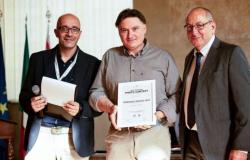On the notes of Enola Gay a new chorus rises:
almost thirty years ago I said goodbye to Serie B
I was relegated to C and I was full of debt
it doesn’t end here the Matarrese sends us to D
Now that I’m here, I want to dream about Serie B
If one day I grow old I will tell my children
what a beautiful life it is, I want to live it with you!
A choir that is already a candidate to become a song-manifesto not only of the moment that the red-blue footballing of Taranto is going through, but also that summarizes the last thirty years, where bitter disappointments have been alternated with very few satisfactions and which he ends with a hymn to desire: “what a beautiful life it is, I want to live it with you!”. We are at the beginning of the second half and these words soar proudly in the air, coming out desiringly from suffering bodies. The Latina continues to push and on the pitch they battle ball after ball, meter by meter. While in the stands it was, unfortunately, a one-way match given the absence of the guests who, rightly, renounced the trip for the mere 100 tickets made available to them, in a reiteration from the beginning of the championship of what is to all intents and purposes one of the greatest sporting injustices that have occurred in the Iacovone in the last few years. The away sector is in fact unusable due to the fire that involved it during the championship opener, caused by the Foggia players but only possible thanks to the criminal positioning of a significant quantity of flammable material under the stands. A lightness that could turn into one of those tragedies that leave their mark and fill the front pages of newspapers for weeks and that still awaits, and so do we, the identification of even just one culprit for its institutional and organizational inadequacy. On the pitch, meanwhile, Taranto suffers but resists, fights, and suffers, in the stands as well as singing mainly you suffer, you suffer a lot, at the same time wondering if you can live this life. But fortunately, it is not the evening in which another chorus comes back into vogue which, in its brevity, instead tells the way in which the Taranto fans interpret their last thirty years: “we deserve more!”.
Core Schkattate
It seems to be a common perception: reading the comments that have been pouring in on social media since Tuesday evening, it seems to be a common idea throughout practically the entire peninsula, the Taranto fans deserve more. More, perhaps, also than its glorious past which is not sufficiently up to par to give the two-man city a single, miserable, presence in the top flight, thus making it a symbol: the largest city in Italy (and perhaps in Europe) not never been represented in the highest national football category. We have always known this in our hearts, often sung about it, but lately we had perhaps almost forgotten it. We’ve spent the last few years – more than a decade actually – brooding, thinking about what could have been and wasn’t, what we missed. So that, while disappointments accumulated and opportunities were lost, the years passed, life changed, some migrated, some were warned, some both; then there were those who gave up, walking away as a healthy exercise in self-preservation. “Core schkattate” are ours, in Italian we could translate as crushed hearts, torn apart, exploded, but it is one of those cases in which translating means betraying, not doing justice to the concept. If linguists like Vera Gheno are now clearing “I like it” because it would strengthen the concept, then perhaps it is time to do the same with dialect, because “schkattate” preserves in its very pronunciation the first explosion and the death of word with the final schwa. Schkattate, only our heart.
«It gets worse. Goes better. I can’t say, I don’t know»
And then the body takes over again. You sleep badly the night before, you don’t eat in the afternoon, your nerves are on edge since the morning. But the match is only in the evening, at 8.30pm, and getting there you already know it will be a tragedy, hoping for a miracle. You don’t remember the last time you felt such tension, or yes, there was a bit of the derby with Bari, devoid of sporting meaning but full of something else; but no, not at these levels. Ah yes, there you are! You haven’t felt like this since your debut in Serie C with Turris in 2021, almost post-Covid, after the victory of the infernal group H of Serie D. That too was a nervous match, that too was a kind of new first time. Well, perhaps the first times can be renewed: when you do something important after years – twelve to be exact since the last time you attended a Serie C play-off – it’s almost as if it were a first time.
«The first time always hurts. The first time it makes you tremble»
But exactly, it is Almost like the first time. The body begins to remember, to tremble, to tremble, the pain is remembered and comes back immediately, suddenly, like a blow that you cannot ease but which feeds on itself in every gesture, posture or contact. He remembers it well, the body, how much it hurt, perhaps more than you. You become something else while the body goes off on a tangent, you are amazed at its propensity for autonomy. You try to drink it to attenuate, perhaps dull, even if you know full well that it won’t work (in fact it won’t). And then it starts to hurt again, almost more than before, almost as if it had to warn you, almost like that function of self-preservation that has pushed many people away but that you ignored as if it were an authority to be mocked but which this time makes itself felt like an emergency, immediate and catastrophic. This situation has a precise yet banal name: tension. You feel it on your skin and in your gut, you feel it in the queue to enter, you feel it in the others who are next to you, you also feel it in the police force. You feel it everywhere, it pervades the environment, making it dense and difficult to navigate, you see it in the team on the pitch which seems like a shadow of the one admired only about ten days ago and which had annihilated Latina himself, even at his home.
“It’s you. It’s you. It’s you, who can give you more?»
Then it ends up that you don’t just recognize the pain but you start to remember other things too. Here’s what the full stadium looked like. This is how he was when he was boiling with passion. What you are facing is a catharsis – fortunately collective because if limited to your individuality you would be ready to raise the white flag and question the status of reality. This is how it was when the bodies vibrated, one on top of the other, manipulated by the fate of a ball bouncing in that green rectangle which, for the stands which surround it, someone – without fear or hesitation – defines as “my home” . Because it will be obvious to say, but cheering is a situated experience and situated the desire for it. On the contrary very located, proximal: the population that occupies the same portion of steps as you is even more excited when the action takes place right in their vicinity. Football on evenings like these unfolds in all its brilliance like a real desiring machine, clear and contingent like an essential, physiological need. And in this trajectory of desire you not only experience pleasure but you recognize yourself, that is, you know yourself again and in the same way, always the same in your metamorphoses, and by yours you mean both those of your body, which is no longer the one you were fifteen years old. ago, but also in the fan body, which has changed in its composition and repertoire. Of course, you are surrounded by familiar faces with which you mutually establish your essence, but also by new figures, including women, girls and infants, who account for the transformations of existence, not to mention the addition of the steps which, they will tell you later, on TV it allows the silences of the curve not to leave the voice of the stands unprotected. And there are traditional choruses – «conquer the victory» is perhaps thirty years old and you sing it as if it were the first – as well as others that have emerged in the moment – «my love come on don’t be jealous*» is perhaps three months old and perhaps you intonate it as if it had always been there. In some ways going to the stadium is a ravewhich in English means deliriousbut with the match it creates a community, collective and competitive form that perhaps only the relationships that develop between the steps and the green rectangle can give back to you: while you ask yourself if this life can be lived, you recognise, once again, that perhaps nothing in the world has ever made you feel so alive.
«The third time makes you think. The fourth time you watch».
No, dear CCCP, you are wrong about this. You don’t even look at the fifth or the sixth or the seventh and so on: far from it. You get upset, you get upset, you get angry, you get hurt. But this doesn’t mean that you will reach the object of your desire and they certainly don’t have to tell you who support Taranto. In this sense, nothing like supporting Taranto constitutes a collective exercise of imagination, which builds an imaginary towards which we are projected and which we know, naively and stubbornly convinced, that one day will turn into reality. Our desire up to now is this: purely imaginative. And this is why it is so frustrating at times: on Tuesday the desire to score remained in our throats, like coitus interruptus, in fact you didn’t sleep perhaps because all that desire with which you were loaded with buckshot needed to be thrown out. But in the meantime we have transformed something, like our relationship with 0-0, a result that this time represents a victory for us while it often constituted a defeat, like when you played the playoffs the very last time.
«In an eternal present, which you cannot understand. The last time never comes»
And imaginative desire is our cross and delight because it allows you to continue to fuel the utopia towards which you are striving. But you don’t forget evenings like these, on the contrary: we don’t forget them. So let’s take all this satisfaction, even if temporary, even if momentary, even if terribly and naively situated. For all those times we thought it wouldn’t be possible anymore. For all those times we tried to touch the past to think it unattainable. For all the pleasure we take in being wrong. For all the joy in finding yourself proven wrong. Dear Taranto, you live with emotions that you know very well you are giving us: what you have had is only a very small taste.
«Magical Taranto, I know no obstacles. What a beautiful life it is, I want to live it with you!»
STiT text
Photo by Fabio Mitidieri
I like:
I like Loading…






